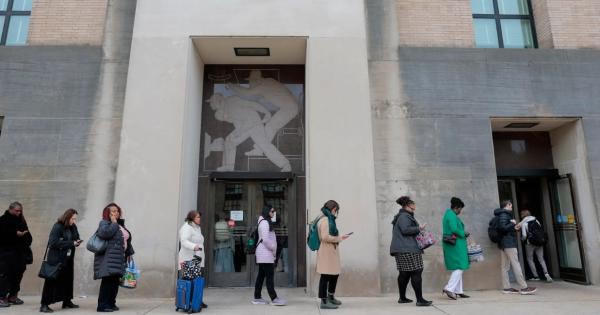Declining U.S. Birth Rate Raises Economic and Policy Concerns

The United States is currently facing a significant demographic challenge as its fertility rate hovers around historic lows, with an average of approximately 1.6 births per woman over her lifetime. This figure falls notably short of the 2.1 births per woman required to sustain the existing population level, signaling potential future demographic shifts. Melissa Kearney, an economics professor at the University of Maryland, highlighted the gravity of the situation, stating, "Our population will, in the not too distant future, start to decline. That's why this is an issue for governments and for the economy, and politicians are starting to pay attention."
The economic repercussions of a diminishing birth rate are wide-ranging and profound. A primary concern is the shrinking pool of future workers, which directly impacts the sustainability of crucial social programs such as Social Security and Medicare. These programs rely heavily on a balanced worker-to-retiree ratio, and a decline in births threatens this equilibrium. Brad Wilcox, a sociology professor at the University of Virginia and director of the Get Married Initiative at the Institute For Family Studies, elaborated on this concern: "The concern here in the U.S. is that if we see kind of dramatic declines in fertility, we will eventually see also kind of a drag on our economy and our capacity to cover all sorts of government programs like Medicare and Social Security."
In response to these declining fertility trends, lawmakers from both political parties have begun to propose various financial incentives aimed at encouraging more births. For instance, The New York Times reported that the White House is considering proposals for lump-sum payments of $5,000 for each newborn. Furthermore, the House recently passed a substantial tax and spending package which, among other provisions, includes an increased child tax credit and the introduction of new "Trump Accounts" designed to provide $1,000 in seed money for newborns. These measures reflect a growing governmental focus on mitigating the economic and social impacts of low birth rates.
However, some experts express skepticism regarding the long-term efficacy of such financial policies. Professor Kearney cautioned that these incentives might not be substantial enough to alter fundamental decisions about childbearing. "I think the kinds of financial incentives or benefits that we're providing just really aren't enough to really change the calculus of, a trade off of ... bringing a child into one's household or family," Kearney explained. "That's an 18-year commitment. It's not just a one-year cost." This perspective suggests that the financial burden of raising a child over nearly two decades often outweighs short-term monetary benefits.
The issue of declining fertility appears to extend beyond purely economic considerations. Experts note that while fertility rates commonly dip during periods of economic uncertainty, they typically rebound once stability returns. Unusually, birth rates in the U.S. did not recover following the Great Recession. Karen Guzzo, director of the Carolina Population Center and a sociology professor at the University of North Carolina at Chapel Hill, pointed out this anomaly: "That kind of caught a lot of demographers around the world flat-footed, because it also didn't happen in other countries. So this goes against a lot of this demographic history that we have, which led people to start thinking, okay, what exactly might be happening?" This deviation from historical trends suggests that deeper, more complex factors are at play.
Many experts believe that America is grappling with a significant cultural shift in how parenthood is perceived and valued. Professor Wilcox observed a growing trend among young adults: "More and more young adults are kind of assuming that what matters for them is their education, their money, and especially their careers." This shift in priorities, where personal and professional achievements are increasingly emphasized over starting families, poses a more intricate challenge than economic factors alone. Addressing America's declining birthrate, therefore, requires a multifaceted approach that considers not only financial aspects but also these evolving societal norms and values regarding family and parenthood.
Recommended Articles
The Dismantling of American Health Care

On July 4 President Donald Trump signed into law a piece of legislation that amounts to a declaration of war on the work...
Villages Health system files for bankruptcy owing millions to Medicare

The Villages Health, or TVH, filed for Chapter 11 bankruptcy on Thursday in the Bankruptcy Court for the Middle District...
The World According to Rick Rule

It’s time to run the 1970s playbook…
The World According to Rick Rule - The Daily Reckoning

It’s time to run the 1970s playbook…
Just $7 Extra Per Person Could Prevent 300 Suicides A Year. Here's Exactly Where To Spend It

Medicare spending on mental health services varies considerably depending on where in Australia you live, our new study ...
How retirees can support their oral health and overall well-being

(Jill Purcell, Head of Dental and Vision Product and Network Management, Guardian and Shawn Patrick, Director of Strateg...
You may also like...
Diddy's Legal Troubles & Racketeering Trial

Music mogul Sean 'Diddy' Combs was acquitted of sex trafficking and racketeering charges but convicted on transportation...
Thomas Partey Faces Rape & Sexual Assault Charges

Former Arsenal midfielder Thomas Partey has been formally charged with multiple counts of rape and sexual assault by UK ...
Nigeria Universities Changes Admission Policies

JAMB has clarified its admission policies, rectifying a student's status, reiterating the necessity of its Central Admis...
Ghana's Economic Reforms & Gold Sector Initiatives

Ghana is undertaking a comprehensive economic overhaul with President John Dramani Mahama's 24-Hour Economy and Accelera...
WAFCON 2024 African Women's Football Tournament

The 2024 Women's Africa Cup of Nations opened with thrilling matches, seeing Nigeria's Super Falcons secure a dominant 3...
Emergence & Dynamics of Nigeria's ADC Coalition

A new opposition coalition, led by the African Democratic Congress (ADC), is emerging to challenge President Bola Ahmed ...
Demise of Olubadan of Ibadanland
Oba Owolabi Olakulehin, the 43rd Olubadan of Ibadanland, has died at 90, concluding a life of distinguished service in t...
Death of Nigerian Goalkeeping Legend Peter Rufai

Nigerian football mourns the death of legendary Super Eagles goalkeeper Peter Rufai, who passed away at 61. Known as 'Do...